Homework 06: Sorting Lists
The goal of this homework assignment is to allow you to explore building
linked lists and sorting them using a variety of algorithms such as
selection sort, merge sort, and quick sort and then utilizing these
data structures and algorithms to implement a version of the sort
utility called lsort.
In high-level languages such as Python, we have a built-in implementation of sorting which work on lists:
# Define a list
>>> numbers = [5, 4, 7, 0, 1]
# Sort list (into new list)
>>> sorted(numbers)
[0, 1, 4, 5, 7]
>>> numbers
[5, 4, 7, 0, 1]
# Sort list (in-place)
>>> numbers.sort()
>>> numbers
[0, 1, 4, 5, 7]
The C standard library provides qsort, but it only operates on arrays. For this assignment, you are to implement the following sorting algorithms to operate on singly linked lists.
-
selection_sort: This uses selection sort to order the values in a singly linked list. -
merge_sort: This uses merge sort to order the values in a singly linked list recursively. -
quick_sort: This uses qsort to order the values in a singly linked list.
For this assignment, you are to do your work in the homework06 folder of
your assignments GitHub repository and push your work by noon
Wednesday, October 4.
Activity 0: Preparation¶
Before starting this homework assignment, you should first perform a git
pull to retrieve any changes in your remote GitHub repository:
$ cd path/to/repository # Go to assignments repository
$ git switch master # Make sure we are in master branch
$ git pull --rebase # Get any remote changes not present locally
Next, create a new branch for this assignment:
$ git checkout -b homework06 # Create homework06 branch and check it out
Task 1: Skeleton Code¶
To help you get started, the instructor has provided you with the following skeleton code:
# Go to assignments repository
$ cd path/to/assignments/repository
# -----------------------------------------------------
# MAKE SURE YOU ARE NOT INSIDE THE homework06 DIRECTORY
# -----------------------------------------------------
# MAKE SURE YOU ARE AT THE TOP-LEVEL DIRECTORY
# -----------------------------------------------------
# Download skeleton code tarball
$ curl -LO https://www3.nd.edu/~pbui/teaching/cse.20312.fa23/static/tar/homework06.tar.gz
# Extract skeleton code tarball
$ tar xzvf homework06.tar.gz
Once downloaded and extracted, you should see the following files in your
homework06 directory:
homework06
\_ Makefile # This is the Makefile for building all the project artifacts
\_ bin # This contains the project binary executables and test scripts
\_ benchmark.py # This is the Python script for benchmarking the lsort program
\_ test_list.sh # This is the shell script for testing the List library
\_ test_lsort.sh # This is the shell script for testing the lsort utility
\_ test_merge.sh # This is the shell script for testing the MergeSort library
\_ test_node.sh # This is the shell script for testing the Node library
\_ test_quick.sh # This is the shell script for testing the QuickSort library
\_ test_selection.sh # This is the shell script for testing the SelectionSort library
\_ include # This contains the project header files
\_ ds # This contains the project data structure header files
\_ list.h # This is the C header file for the List library
\_ node.h # This is the C header file for the Node library
\_ sorts.h # This is the C header file for the Sorting libraries
\_ lib # This contains the project library files
\_ src # This contains the project source code
\_ list.c # This is the C source code for the List library
\_ lsort.c # This is the C source code for the lsort utility
\_ merge_sort.c # This is the C source code for the MergeSort library
\_ node.c # This is the C source code for the Node library
\_ quick_sort.c # This is the C source code for the QuickSort library
\_ selection_sort.c # This is the C source code for the SelectionSort library
\_ tests # This contains the project unit tests
\_ unit_list.c # This is the unit test for the List library
\_ unit_merge.c # This is the unit test for the MergeSort library
\_ unit_node.c # This is the unit test for the Node library
\_ unit_quick.c # This is the unit test for the QuickSort library
\_ unit_selection.c # This is the unit test for the SelectionSort library
Task 2: Initial Import¶
Now that the files are extracted into the homework06 folder, you can
commit them to your git repository:
# Go into homework06 folder
$ cd homework06
# Add and commit initial skeleton files
$ git add Makefile # Mark changes for commit
$ git add bin/*.sh bin/*.py # Mark changes for commit
$ git add include/ds/*.h # Mark changes for commit
$ git add lib/.gitkeep # Mark changes for commit
$ git add src/*.c # Mark changes for commit
$ git add tests/*.c # Mark changes for commit
$ git commit -m "Homework 06: Initial Import" # Record changes
The details on what you need to implement are described in the following sections.
Task 3: Makefile¶
The Makefile contains all the rules or recipes for building the project
artifacts (e.g. lsort, libds.a, unit_list, unit_merge,
unit_node, unit_quick, unit_selection, etc.):
CC= gcc
CFLAGS= -Wall -std=gnu99 -g -Iinclude
AR= ar
ARFLAGS= rcs
LD= gcc
LDFLAGS= -Llib
all: bin/lsort
test:
@$(MAKE) -sk test-all
test-all: test-node test-list test-selection test-merge test-quick test-lsort
# TODO: Pattern rule for object files
# TODO: Rule for lib/libds.a
# TODO: Rule for bin/lsort
bin/unit_node: tests/unit_node.o lib/libds.a
$(LD) $(LDFLAGS) -o $@ $^
bin/unit_list: tests/unit_list.o lib/libds.a
$(LD) $(LDFLAGS) -o $@ $^
bin/unit_selection: tests/unit_selection.o lib/libds.a
$(LD) $(LDFLAGS) -o $@ $^
bin/unit_merge: tests/unit_merge.o lib/libds.a
$(LD) $(LDFLAGS) -o $@ $^
bin/unit_quick: tests/unit_quick.o lib/libds.a
$(LD) $(LDFLAGS) -o $@ $^
test-node: bin/unit_node
bin/test_node.sh
test-list: bin/unit_list
bin/test_list.sh
test-selection: bin/unit_selection
bin/test_selection.sh
test-merge: bin/unit_merge
bin/test_merge.sh
test-quick: bin/unit_quick
bin/test_quick.sh
test-lsort: bin/lsort
bin/test_lsort.sh
clean:
rm -f bin/lsort bin/unit_* lib/*.a src/*.o tests/*.o
For this task, you will need to add rules for building the static library
lib/libds.a and the program bin/lsort. Be sure to have a recipe
for any intermediate object files that libraries require as shown in the
DAG below:
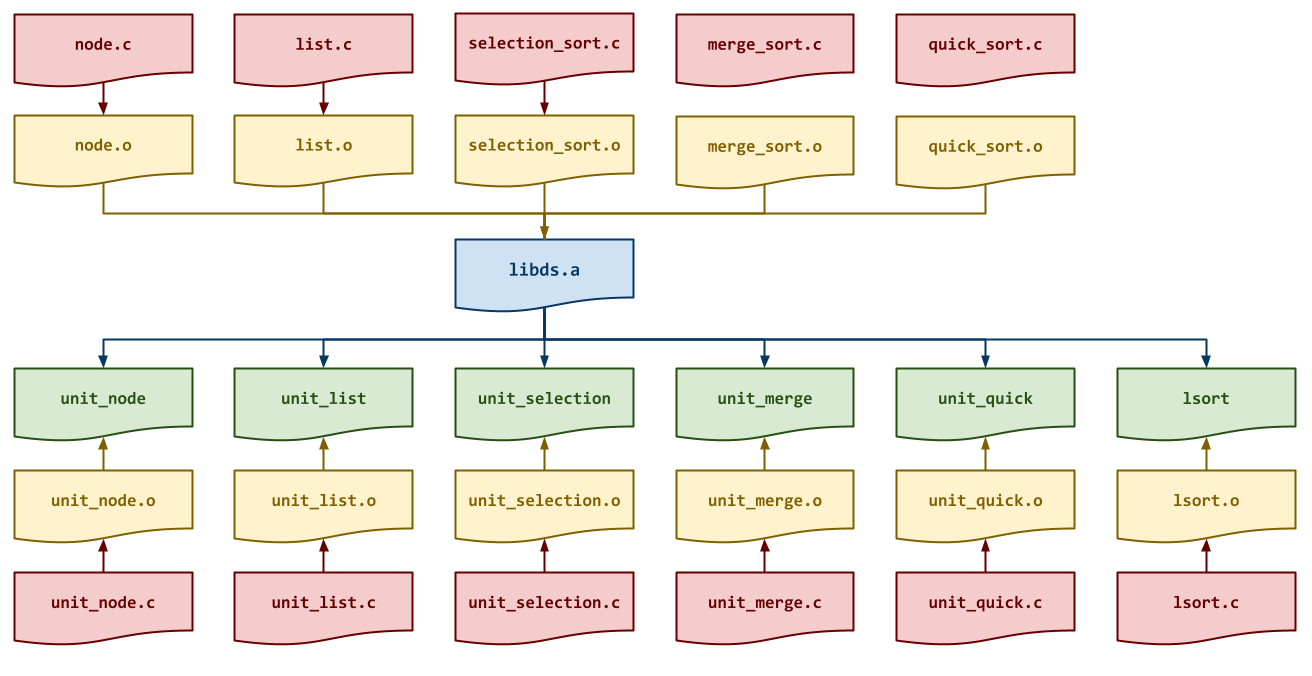
Makefile Variables¶
You must use the CC, CFLAGS, LD, LDFLAGS, AR, and ARFLAGS
variables when appropriate in your rules. You should also consider using
automatic variables such as $@ and $< as well.
Once you have a working Makefile, you should be able to run the following
commands:
# Build all TARGETS
$ make
gcc -Wall -std=gnu99 -g -Iinclude -c -o src/lsort.o src/lsort.c
gcc -Wall -std=gnu99 -g -Iinclude -c -o src/node.o src/node.c
gcc -Wall -std=gnu99 -g -Iinclude -c -o src/list.o src/list.c
gcc -Wall -std=gnu99 -g -Iinclude -c -o src/selection_sort.o src/selection_sort.c
gcc -Wall -std=gnu99 -g -Iinclude -c -o src/merge_sort.o src/merge_sort.c
gcc -Wall -std=gnu99 -g -Iinclude -c -o src/quick_sort.o src/quick_sort.c
ar rcs lib/libds.a src/node.o src/list.o src/selection_sort.o src/merge_sort.o src/quick_sort.o
gcc -Llib -o bin/lsort src/lsort.o lib/libds.a
# Run all tests
$ make test
Testing node...
...
# Remove generated artifacts
$ make clean
rm -f bin/lsort bin/unit_* lib/*.a src/*.o tests/*.o
Note: The tests will fail if you haven't implemented Node,
List, or sorting libraries, or the lsort program.
Warnings¶
You must include the -Wall flag in your CFLAGS when you compile. This
also means that your code must compile without any warnings, otherwise
points will be deducted.
After completing the Makefile and verifying that you can produce all the
specified artifacts, you may begin implementing the data structures and
applications for this assignment.
Activity 1: Node Library (1 Point)¶
For the first activity, you are to implement a Node structure to be
used in a singly linked list. Each Node structure will have the
following attributes:
data: This is a pointer to a string allocated on the heap.next: This is a pointer to the nextNodestruct in the sequence.
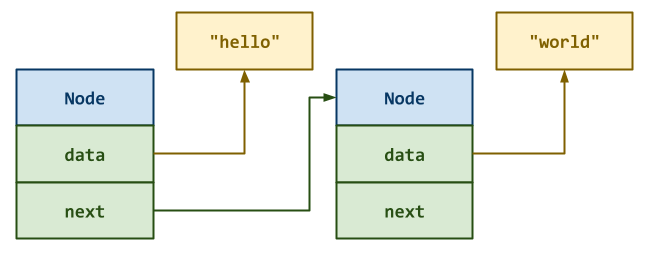
Task 1: include/ds/node.h¶
The include/ds/node.h file is the header file for the Node
structure, which contains the following structs and function
prototypes:
/* node.h: Node Structure */
#pragma once
#include <stdio.h>
#include <stdlib.h>
/* Structure */
typedef struct Node Node;
struct Node {
char *data;
Node *next;
};
/* Type Definitions */
typedef int (*Comparison)(const void *, const void *);
/* Functions */
Node * node_create(char *data, Node *next);
void node_delete(Node *n);
int node_compare_as_strings(const void *a, const void *b);
int node_compare_as_numbers(const void *a, const void *b);
Other programs will #include this file in order to use the functions we
will be implementing in this library.
Note: Comparison is a type definition for functions such as
node_compare_as_strings and node_compare_as_numbers.
Note: For this task, you do not need to modify this file. Instead, you should review it and ensure you understand the provided code.
Task 2: src/node.c¶
The src/node.c file contains the C implementation for the Node
structure. For this task, you will need to implement the following
functions:
-
Node* node_create(char *data, Node *next)This function allocates a new
Nodestruct and initializes its internal attributes:dataandnext. -
void node_delete(Node *n)This function deallocates the given
Nodestruct along with its internaldatastring. -
int node_compare_as_strings(const void *a, const void *b)This function compares two
Nodestructures by treating theirdataattributes as strings. -
int node_compare_as_numbers(const void *a, const void *b)This function compares two
Nodestructures by treating theirdataattributes as integers.
Task 3: Testing¶
As you implement the functions in src/node.c, you should use
bin/test_node.sh to test each function:
# Build unit-test
$ make bin/unit_node
gcc -Wall -std=gnu99 -g -Iinclude -c -o tests/unit_node.o tests/unit_node.c
gcc -Llib -o bin/unit_node tests/unit_node.o lib/libds.a
# Run test script manually
$ ./bin/test_node.sh
Testing node...
node_create ... Success
node_delete ... Success
node_compare_as_strings ... Success
node_compare_as_numbers ... Success
Score 1.00 / 1.00
Status Success
Alternatively, you can both build the artifacts and run the test script by doing the following:
# Build and run test scripts
$ make test-node
...
If one of the functions fails, and you need to debug the unit tests, you
can run the bin/unit_node command directly:
# Display usage message
$ ./bin/unit_node
Usage: ./bin/unit_node NUMBER
Where NUMBER is right of the following:
0 Test node_create
1 Test node_delete
2 Test node_compare_as_strings
3 Test node_compare_as_numbers
# Run test for node_create
$ ./bin/unit_node 0
# Run test for node_create using GDB
$ gdb ./bin/unit_node
...
(gdb) run 0
# Run test for node_create using Valgrind
$ valgrind --leak-check=full ./bin/unit_node 0
Of course, you are free to create your own test programs to debug and test
your Node library.
Iterative Development¶
You should practice iterative development. That is, rather than writing a bunch of code and then debugging it all at once, you should concentrate on one function at a time and then test that one thing at a time. The provided unit tests allow you to check on the correctness of the individual functions without implementing everything at once. Take advantage of this and build one thing at a time.
Activity 2: List Library (4 Points)¶
For the second activity, you are to complete the List structure that
implements a [singly liked list] with a tail pointer.

As can seen, each List structure has the following attributes:
head: This is a pointer to the firstNodestruct in the sequence.tail: This is a pointer to the lastNodestruct in the sequence.size: This is the number ofNodestructures in the sequence.
Task 1: include/ds/list.h¶
The include/ds/list.h file is the header file for the List
structure, which contains the following structs and function
prototypes:
/* list.h: List Structure */
#pragma once
#include "node.h"
#include <stdio.h>
#include <stdlib.h>
/* Structure */
typedef struct {
Node *head;
Node *tail;
size_t size;
} List;
/* Functions */
List * list_create();
void list_delete(List *l);
void list_append(List *l, char *s);
void list_dump(List *l, FILE *fs);
void list_split(Node *n, Node **left, Node **right);
Node * list_merge(Node *left, Node *right, Comparison cmp);
Node** list_nodes(List *l);
void list_update(List *l, Node **a);
Note: For this task, you do not need to modify this file. Instead, you should review it and ensure you understand the provided code.
Task 2: src/list.c¶
The src/list.c file contains the C implementation for the List
structure. For this task, you will need to implement the following functions:
-
List* list_create()This function allocates a new
ListSetstruct and initializes its internal attributes:head,tail, andsize. -
void list_delete(List *l)This function deallocates all the internal
Nodestructures in theListstructure, and then theListstruct itself.Hint: Use
node_deleteandfreeto deallocate the appropriate objects from the heap. -
void list_append(List *l, char *s)This function creates a new
Nodestruct with the given stringsand adds it to the back of the internal singly linked list (e.g.l.append(s)in Python).Hint: Use
node_createand make sure you update thehead,tail, andsizeattributes of theListstruct appropriately. -
void list_dump(List *l, FILE *fs)This function prints every value in the
Liststruct to the given stream (one value per line). -
void list_split(Node *n, Node **left, Node **right)This function splits the singly linked list starting at
ninto two relatively equally sized sublists:leftandright. After this function,leftwill point to the first node in theleftsublist, andrightwill point to the first node in therightsublist.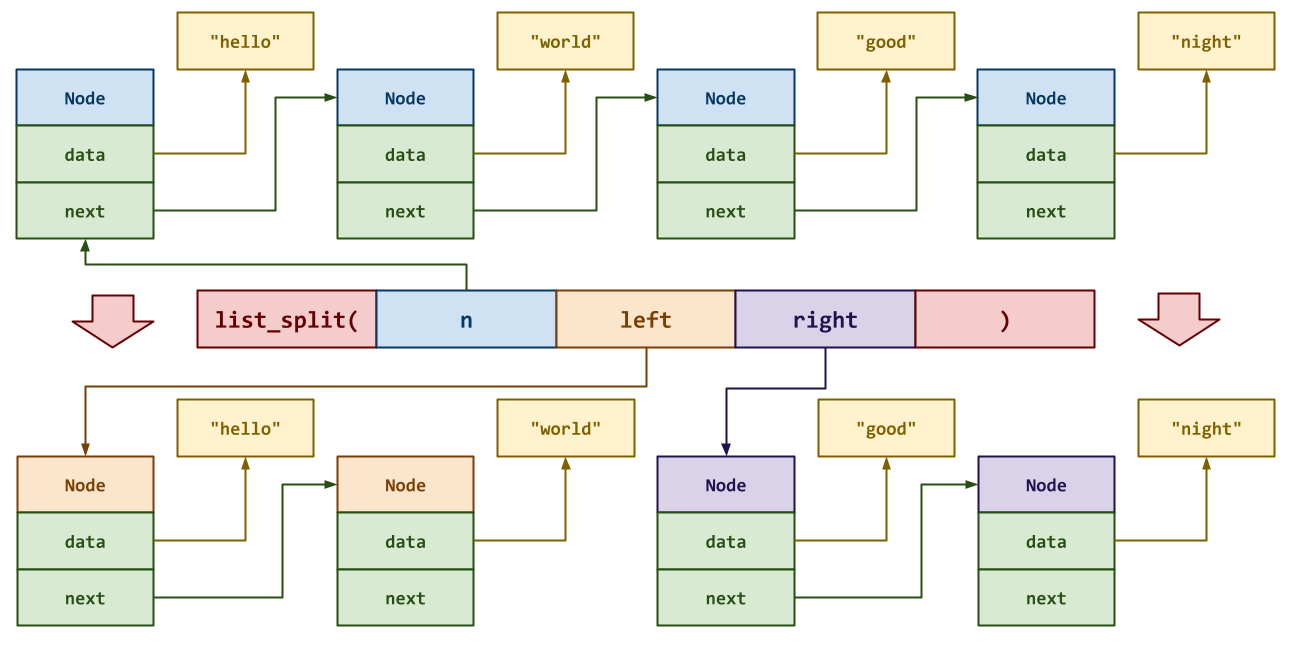
Hint: Use the slow and fast pointer technique to find the middle of the singly linked list.
To terminate the
leftsublist, consider adding atailpointer in addition to aslowandfastpointer and settingtail->nexttoNULL. -
Node * list_merge(Node *left, Node *right, Comparison cmp)This function merges the
leftandrightsingly linked lists into one ordered singly linked list and returns the pointer to the firstNodein the new sequence. To compareNodestructures, it uses the providedcmpComparisonfunction.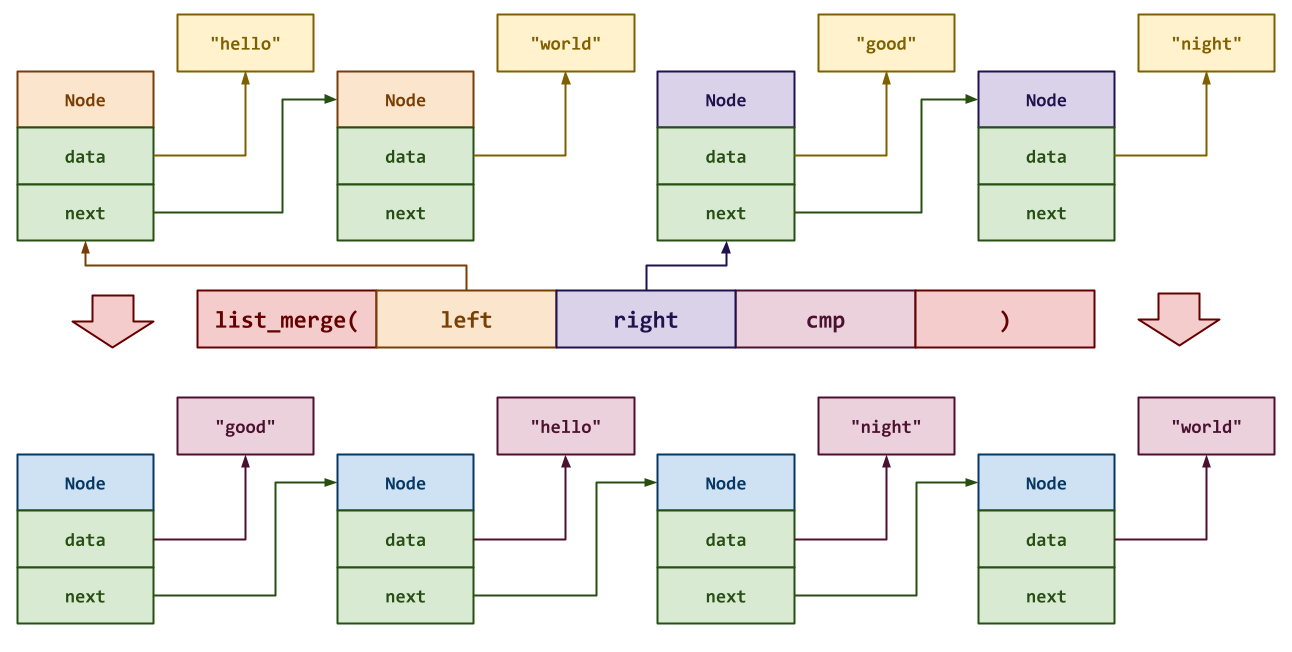
Hint: First determine which
Nodefrom either theleftorrightis the head of the new singly linked list. Next, connect the smallest element from either theleftorrightsubsequences to the tail of the new singly linked list until either subsequence is exhausted. Finally, connect the remaining subsequence to the tail of the new singly linked list. -
Node ** list_nodes(List *l)This function returns an array of pointers to the
Nodestructures in the givenListstruct.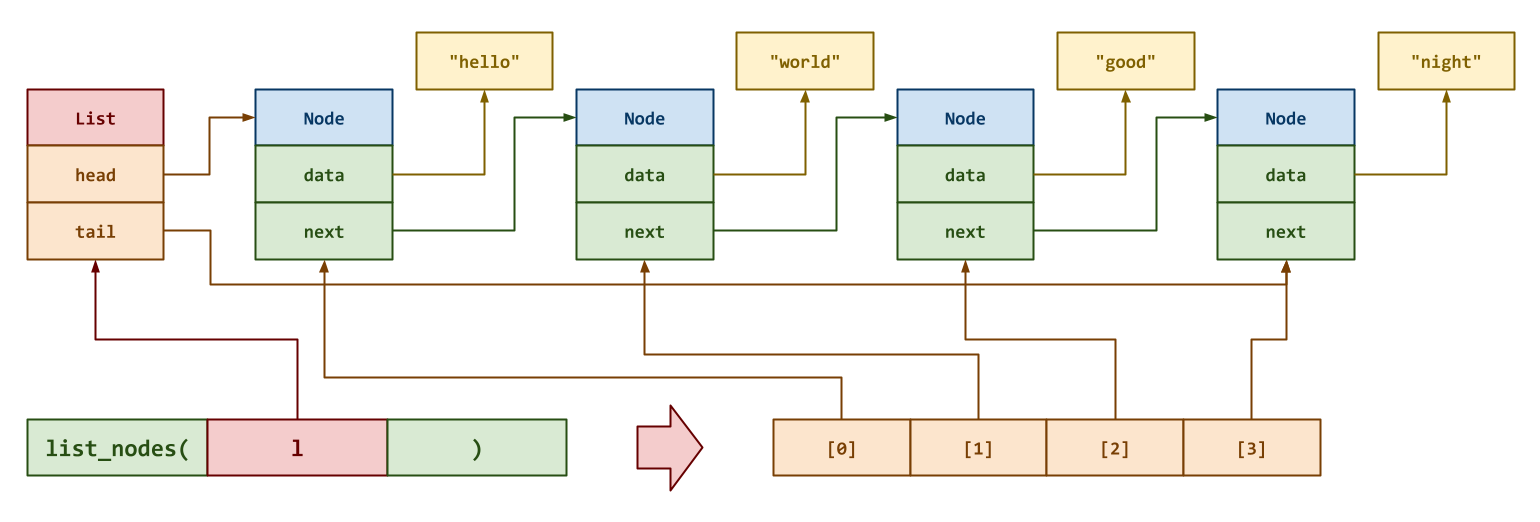
-
void list_update(List *l, Node **a)This function updates the internal
Nodestructures in theListstructure with the ordering in the given array ofNodestructs.
Task 3: Testing¶
As you implement the functions in src/list.c, you should use
bin/test_list.sh to test each function:
# Build unit-test
$ make bin/unit_list
gcc -Wall -std=gnu99 -g -Iinclude -c -o tests/unit_list.o tests/unit_list.c
gcc -Llib -o bin/unit_list tests/unit_list.o lib/libds.a
# Run test script manually
$ ./bin/test_list.sh
Testing list...
list_create ... Success
list_delete ... Success
list_append ... Success
list_dump ... Success
list_split ... Success
list_merge ... Success
list_nodes ... Success
list_update ... Success
Score 3.00 / 3.00
Status Success
Alternatively, you can both build the artifacts and run the test script by doing the following:
# Build and run test scripts
$ make test-list
...
If one of the functions fails, and you need to debug the unit tests, you
can run the bin/unit_list command directly:
# Display usage message
$ ./bin/unit_list
Usage: ./bin/unit_list NUMBER
Where NUMBER is right of the following:
0 Test list_create
1 Test list_delete
2 Test list_append
3 Test list_dump
4 Test list_split
5 Test list_merge
6 Test list_nodes
7 Test list_update
# Run test for list_create
$ ./bin/unit_list 0
# Run test for list_create using GDB
$ gdb ./bin/unit_list
...
(gdb) run 0
# Run test for list_create using Valgrind
$ valgrind --leak-check=full ./bin/unit_list 0
Of course, you are free to create your own test programs to debug and test
your List library.
Activity 3: Selection Sort (1 Point)¶
For this activity, you are to implement selection sort.

As discussed in class, selection sort involves finding the minimum value in a subsequence and swapping it with the current value if necessary.
Task 1: include/ds/sorts.h¶
The include/ds/sorts.h file is the header file for all the sorting
algorithms, which contains the following function prototypes:
/* sorts.h: Sorting Algorithms */
#pragma once
#include "ds/list.h"
/* Functions */
void selection_sort(List *l, Comparison cmp);
void merge_sort(List *l, Comparison cmp);
void quick_sort(List *l, Comparison cmp);
Note: For this task, you do not need to modify this file. Instead, you should review it and ensure you understand the provided code.
Task 2: src/selection_sort.c¶
The src/selection_sort.c file contains the C implementation for the
selection sort algorithm. For this task, you will need to implement the
following functions:
-
void selection_sort(List *l, Comparison cmp)This function performs selection sort on the given
Listand orders values using the specifiedComparisonfunction.Hint: You can just swap the
dataattributes of the current and minimumNodes. You don't have to swap the actualNodestructs.
Task 3: Testing¶
As you implement the functions in src/selection_sort.c, you should use
bin/test_selection.sh to test each function:
# Build unit-test
$ make bin/unit_selection
gcc -Wall -std=gnu99 -g -Iinclude -c -o tests/unit_selection.o tests/unit_selection.c
gcc -Llib -o bin/unit_selection tests/unit_selection.o lib/libds.a
# Run test script manually
$ ./bin/test_selection.sh
Testing selection...
selection_sort_strings ... Success
selection_sort_numbers ... Success
Score 1.00 / 1.00
Status Success
Alternatively, you can both build the artifacts and run the test script by doing the following:
# Build and run test scripts
$ make test-selection
...
If one of the functions fails, and you need to debug the unit tests, you
can run the bin/unit_selection command directly:
# Display usage message
$ ./bin/unit_selection
Usage: ./bin/unit_selection NUMBER
Where NUMBER is right of the following:
0 Test selection_sort_strings
1 Test selection_sort_numbers
# Run test for selection_sort
$ ./bin/unit_selection 0
# Run test for selection_sort using GDB
$ gdb ./bin/unit_selection
...
(gdb) run 0
# Run test for selection_sort using Valgrind
$ valgrind --leak-check=full ./bin/unit_selection 0
Of course, you are free to create your own test programs to debug and test your selection sort implementation.
Activity 4: Merge Sort (3 Points)¶
For this activity, you are to use divide-and-conquer to recursively implement merge sort.
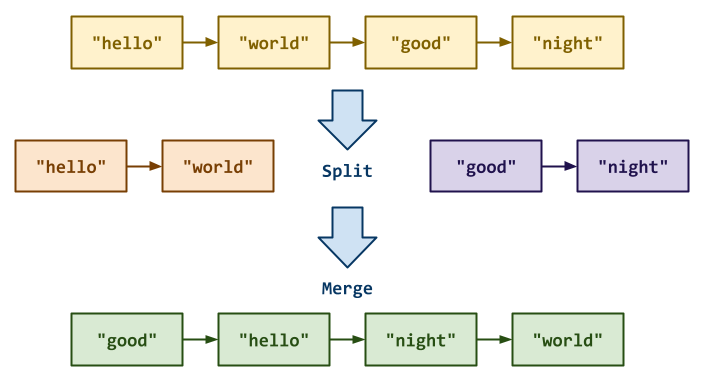
As discussed in class, merge sort uses divide-and-conquer:
- Divide: Split the
Listin half. - Conquer: Recursively sort the left and right subsequences.
- Combine: Merge the sorted subsequences.
Task 1: src/merge_sort.c¶
The src/merge_sort.c file contains the C implementation for the
merge sort algorithm. For this task, you will need to implement the
following functions:
-
void merge_sort(List *l, Comparison cmp)This function performs merge sort on the given
Listand orders values using the specifiedComparisonfunction.Hint: You can update the
headwithmerge_sort_rand then update thetailonce the theListis sorted. -
Node * merge_sort_r(Node *n, Comparison cmp)This helper function uses divide-and-conquer to recursively perform merge sort on the given sequence that begins with
nand returns a pointer to the the firstNodestruct in the sorted sequence.Hint: Consider using
list_splitandlist_merge.
Task 2: Testing¶
As you implement the functions in src/merge_sort.c, you should use
bin/test_merge.sh to test each function:
# Build unit-test
$ make bin/unit_merge
gcc -Wall -std=gnu99 -g -Iinclude -c -o tests/unit_merge.o tests/unit_merge.c
gcc -Llib -o bin/unit_merge tests/unit_merge.o lib/libds.a
# Run test script manually
$ ./bin/test_merge.sh
Testing merge...
merge_sort_strings ... Success
merge_sort_numbers ... Success
Score 3.00 / 3.00
Status Success
Alternatively, you can both build the artifacts and run the test script by doing the following:
# Build and run test scripts
$ make test-merge
...
If one of the functions fails, and you need to debug the unit tests, you
can run the bin/unit_merge command directly:
# Display usage message
$ ./bin/unit_merge
Usage: ./bin/unit_merge NUMBER
Where NUMBER is right of the following:
0 Test merge_sort_strings
1 Test merge_sort_numbers
# Run test for merge_sort
$ ./bin/unit_merge 0
# Run test for merge_sort using GDB
$ gdb ./bin/unit_merge
...
(gdb) run 0
# Run test for merge_sort using Valgrind
$ valgrind --leak-check=full ./bin/unit_merge 0
Of course, you are free to create your own test programs to debug and test your merge sort implementation.
Activity 5: Quick Sort (1 Point)¶
For this activity, you are to use qsort to implement quick sort. To do
this, you will convert the singly linked list in the List structure
into an array, perform qsort on the array, and then update the original
List structure.
Task 1: src/quick_sort.c¶
The src/quick_sort.c file contains the C implementation for the
quick sort algorithm. For this task, you will need to implement the
following functions:
-
void quick_sort(List *l, Comparison cmp)This function performs quick sort on the given
Listand orders values using the specifiedComparisonfunction.Hint: Consider using
list_nodesandlist_update.
Task 2: Testing¶
As you implement the functions in src/quick_sort.c, you should use
bin/test_quick.sh to test each function:
# Build unit-test
$ make bin/unit_quick
gcc -Wall -std=gnu99 -g -Iinclude -c -o tests/unit_quick.o tests/unit_quick.c
gcc -Llib -o bin/unit_quick tests/unit_quick.o lib/libds.a
# Run test script manually
$ ./bin/test_quick.sh
Testing quick...
quick_sort_strings ... Success
quick_sort_numbers ... Success
Score 1.00 / 1.00
Status Success
Alternatively, you can both build the artifacts and run the test script by doing the following:
# Build and run test scripts
$ make test-quick
...
If one of the functions fails, and you need to debug the unit tests, you
can run the bin/unit_quick command directly:
# Display usage message
$ ./bin/unit_quick
Usage: ./bin/unit_quick NUMBER
Where NUMBER is right of the following:
0 Test quick_sort_strings
1 Test quick_sort_numbers
# Run test for quick_sort
$ ./bin/unit_quick 0
# Run test for quick_sort using GDB
$ gdb ./bin/unit_quick
...
(gdb) run 0
# Run test for quick_sort using Valgrind
$ valgrind --leak-check=full ./bin/unit_quick 0
Of course, you are free to create your own test programs to debug and test your quick sort implementation.
Activity 6: List Sort (2 Points)¶
For the last activity, you are to use your List and sorting algorithms
library to implement a version of the traditional Unix utility called
bin/lsort.
# Use selection sort to order input as strings
$ seq 1 10 | ./bin/lsort
1
10
2
3
4
5
6
7
8
9
# Use quick sort to order input as numbers
$ seq 1 10 | ./bin/lsort -q -n
1
2
3
4
5
6
7
8
9
10
The bin/lsort program should support the following command line options:
-m: Use merge sort.-q: Use quick sort.-n: Compare each line as numbers.
By default, bin/lsort uses selection sort and compares each line as strings.
Memory Management¶
In addition to meeting the functional requirements of the assignment (as described above), your program must not exhibit any memory leaks or invalid memory accesses as would be detected by Valgrind.
Be sure to free any memory that has been allocated on the heap and to initialize any allocate memory appropriately.
Task 1: src/lsort.c¶
The src/lsort.c file contains the C implementation of the
bin/lsort program described above. You will need to implement the
following functions:
-
int main(int argc, char *argv[])This function should do the following:
- Parse the command line options.
- Read each line from
stdininto aList. - Sort the
Listusing the appropriate sorting algorithm. - Dump the contents of the
List.
Hint: Take advantage of the Function and Comparison type
definitions to treat functions as pointers that can be assigned to
variables:
// Assign functions as variables
Function sort = selection_sort;
Comparison cmp = node_compare_as_strings;
...
// Use function variables
sort(l, cmp);
Task 2: Testing¶
As you implement src/lsort.c, you can test it by running the
test-lsort target:
# Build artifact and run test
$ make test-lsort
bin/test_lsort.sh
Testing lsort ...
Selection Sort - Strings (output) ... Success
Selection Sort - Strings (valgrind) ... Success
Selection Sort - Numbers (output) ... Success
Selection Sort - Numbers (valgrind) ... Success
Merge Sort - Strings (output) ... Success
Merge Sort - Strings (valgrind) ... Success
Merge Sort - Numbers (output) ... Success
Merge Sort - Numbers (valgrind) ... Success
Quick Sort - Strings (output) ... Success
Quick Sort - Strings (valgrind) ... Success
Quick Sort - Numbers (output) ... Success
Quick Sort - Numbers (valgrind) ... Success
Score 2.00 / 2.00
Status Success
Activity 7: Quiz (2 Points)¶
Once you have completed all the activities above, you are to complete the following reflection quiz:
As with Reading 01, you will need to store your answers in a
homework06/answers.json file. You can use the form above to generate the
contents of this file, or you can write the JSON by hand.
To check your quiz directly, you can use the check.py script:
$ ../.scripts/check.py
Checking homework06 quiz ...
Q1 0.40
Q2 0.40
Q3 0.30
Q4 0.30
Q5 0.20
Q6 0.10
Q7 0.30
Score 2.00 / 2.00
Status Success
Leet Point (1 Extra Credit Point)¶
For extra credit, you are to solve the following LeetCode problem in C.
To receive credit, you must pass on LeetCode and achieve an Accepted submission.
Verification¶
To get credit for this Leet Point, show your solution and the LeetCode acceptance page to a TA to verify (or attached a screenshot with both to your Pull Request). You have up until two days after this assignment is due to verify your Leet Point.
Self-Service Extension¶
Remember that you can always forgo this Leet Point for two extra days to do the homework. That is, if you need an extension, you can simply skip the Leet Point and you will automatically have until Friday to complete the assignment for full credit.
Just leave a note on your Pull Request of your intentions.
Submission¶
To submit your assignment, please commit your work to the homework06 folder
of your homework06 branch in your assignments GitHub repository:
#-----------------------------------------------------------------------
# Make sure you have already completed Activity 0: Preparation
#-----------------------------------------------------------------------
...
$ git add Makefile # Mark changes for commit
$ git commit -m "Homework 06: Activity 0" # Record changes
...
$ git add src/node.c # Mark changes for commit
$ git commit -m "Homework 06: Activity 1" # Record changes
...
$ git add src/list.c # Mark changes for commit
$ git commit -m "Homework 06: Activity 2" # Record changes
...
$ git add src/selection_sort.c # Mark changes for commit
$ git commit -m "Homework 06: Activity 3" # Record changes
...
$ git add src/merge_sort.c # Mark changes for commit
$ git commit -m "Homework 06: Activity 4" # Record changes
...
$ git add src/quick_sort.c # Mark changes for commit
$ git commit -m "Homework 06: Activity 5" # Record changes
...
$ git add src/lsort.c # Mark changes for commit
$ git commit -m "Homework 06: Activity 6" # Record changes
...
$ git add answers.json # Mark changes for commit
$ git commit -m "Homework 06: Activity 7" # Record changes
...
$ git push -u origin homework06 # Push branch to GitHub
Pull Request¶
Remember to create a Pull Request and assign the appropriate TA from the Reading 06 TA List.
DO NOT MERGE your own Pull Request. The TAs use open Pull Requests to keep track of which assignments to grade. Closing them yourself will cause a delay in grading and confuse the TAs.